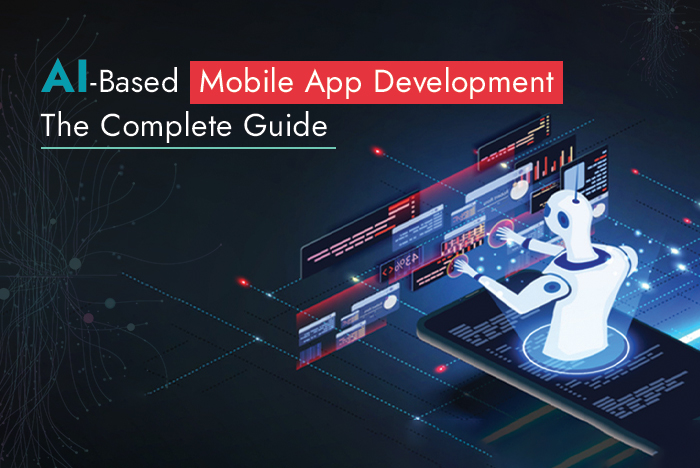Artificial Intelligence (AI) is transforming nearly every industry, and mobile app development is no exception. Whether predictive typing or smart voice assistants or image identification, AI-driven features are no longer an extravagance—they're a necessity for developers who want to create future-proof mobile experiences. This tutorial will walk you through the basics of AI in mobile app development, how to cope with it, tools you can utilize, and guidance in the future.
What is Artificial Intelligence for Mobile Application Development?
Artificial Intelligence in mobile application development refers to the application of machine learning algorithms, natural language processing (NLP), computer vision, and other smart technologies inside mobile apps. They all allow apps to learn from user behaviour, gain experience, and respond based on inference—mimicking human smartness in a million ways.
AI-based apps can be initiated using voice commands, can be tailored, recognize images, can predict user actions, and even carry out tasks. As the users themselves are looking for natural and in-seam experiences these days, AI is now part of mobile app development.
Benefits of AI in Mobile Apps
There are various advantages of applying AI in mobile apps:
Personalized User Experience
AI. It enables mobile apps to gain insight into users' long-term behavioural patterns and interests and give them personalized content, reminders, and recommendations. Personalization leads to increased user engagement and satisfaction.
Improved App Security
AI provides real-time detection of suspicious behaviour, unauthorized access, and future security attacks. Fraud detection, fingerprint/face recognition (biometric authentication), and behaviour analysis make up app security from AI features.
Effective Automation of Tasks
AI can execute routine or repetitive work such as scheduling, customer service (chatbots), and data entry with economic benefits and more efficiency.
Improved Customer Support
AI virtual assistants and chatbots can deliver on-the-spot customer support, 24/7, with reduced response time and customer frustration.
Improved Data Analytics
AI assists in processing large sets of data that are being generated by the users, providing valuable data regarding usage patterns, app usage, and market trends. Data can be utilized in app development and business decision-making.
Mobile Application Development With AI Technology
There are some applications of AI that are extremely helpful in mobile application development:
Machine Learning (ML)
ML allows apps to get better over time by learning from data without programming. It drives recommendations, predictions, personalization, and a lot more.
Natural Language Processing (NLP)
NLP is used for processing, analyzing, and generating human language. NLP is responsible for voice assistants such as Siri, Alexa, and Google Assistant, chatbots, and opinion analysis.|
Face Detection
This makes it possible for apps to "see" and interpret visual input like images and videos. Examples include face detection, AR filters, and object recognition.
Voice Recognition
Voice apps are able to hear voice commands and talk. This is more convenient as well as a hands-free experience.
Predictive Analytics
It is based on historical data and machine learning algorithms to forecast future action. It is used in e-commerce (forecasts customer buying patterns), health apps (monitors health), etc.
Top Most Used Mobile App AI Uses
AI can be used to enhance nearly any type of mobile application. The most widely used AI-based features across domains are:
E-commerce Apps
- Recommendations based on web browsing history
- Customer service bots
- Visual search and AR try-ons (e.g., clothing, eyewear)
Healthcare Apps
- Symptom screening and diagnostic apps
- Remote patient monitoring
- Personalized exercise regimens and disease tracking
Finance Apps
- Fraud and risk identification
- Smart budgeting and cost management
- Personalized finance planning with AI assistants
Social Apps
- Facial recognition with face tagging
- False news detection and content blocking
- Targeted ads and personalized feeds
Edutainment Apps
- AI teachers and virtual tour guides
- Paths of learning that adapt
-
Automated grading and plagiarism
Mobile AI Development Tools and Platforms
There are several platforms and tools that provide ease of integrating AI into mobile applications. Some of the most popular ones are mentioned below:
1. TensorFlow Lite
A Google TensorFlow library port that is mobile and embedded platform friendly. Great for deploying ML models on-device.
2. Core ML
Apple's ML framework that previously introduced AI to iOS apps. Provides a wide range of image recognition, NLP, and other model support.
3. ML Kit (Firebase)
Google's machine learning SDK for Android and iOS. Offers simple APIs for text recognition, face detection, language translation, etc.
4. Microsoft Azure
AI Provides cloud-based AI features such as computer vision, NLP, and decision-making for mobile.
5. IBM
Watson Provides various AI capabilities, such as language understanding, vision recognition, and voice activation.
Problems of AI Application in Smartphone
Use While there are some advantages, mobile application of AI has drawbacks:
1. Data Privacy
AI will have to be trained on large data sets, frequently user-sensitive information. Access and compliance with data protection (e.g., GDPR, HIPAA) need to be safeguarded.
2. Performance and Power Consumption
AI model run-time, especially on-device, is power-hungry. Performance without any cost to battery life is crucial for developers.
3. Training and Tuning of Models Quality
AI models need quality data, professional tuning, and care. Poorly trained models can produce buggy outputs.
4. High Development Costs
AI adoption will lead to higher development time and cost as it will require sophisticated skills and tools.
AI-Driven Best Practices for Mobile App Integration
To best utilize mobile apps with AI, use the following best practices:
- Start Small: Implement one AI feature (e.g., a chatbot or recommendation system) and scale according to the need.
-
Use Pre-Built Models: Leverage pre-existing APIs and frameworks to avoid complexity and time needed.
-
UX Priority: Use AI capability as an enhancement—and never a distraction—from user experience.
-
Test Thoroughly: AI systems must be rigorously tested for accuracy, fairness, and edge cases.
-
Secure & Compliant: Protect users' data in an encrypted form and comply with data usage regulation.
Conclusion
AI is not a trend—it's an evolutionary step towards mobile app development (Android & Iphone). From enhanced user experience to mechanizing mundane tasks and releasing previously dormant intelligence, AI is opening the door to a new generation of smart, responsive mobile apps. To businesses and developers, it's about remaining in business, being relevant, and delivering value that today's consumers demand. Either you're building a brand-new app from scratch or optimizing an already existing one—in either case, the time to take advantage of the capabilities of AI is now.
Contact us & Talk to Our Experts and Let’s Take your Business to The Next Level Together!










